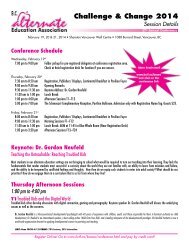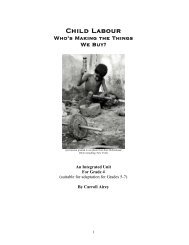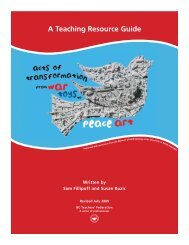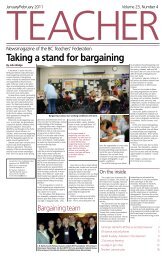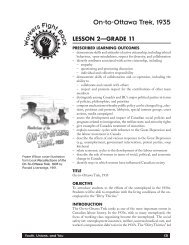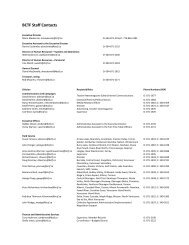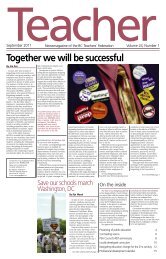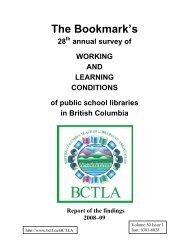Teacher Inquiry in the BCTF - British Columbia Teachers' Federation
Teacher Inquiry in the BCTF - British Columbia Teachers' Federation
Teacher Inquiry in the BCTF - British Columbia Teachers' Federation
Create successful ePaper yourself
Turn your PDF publications into a flip-book with our unique Google optimized e-Paper software.
<strong>Teacher</strong> <strong>Inquiry</strong> <strong>in</strong> <strong>the</strong> <strong>BCTF</strong>:<br />
A focus for support<strong>in</strong>g<br />
teachers’ professional development<br />
A report to <strong>the</strong> <strong>BCTF</strong> Executive Committee<br />
from <strong>the</strong> <strong>Teacher</strong> <strong>Inquiry</strong> Work Group<br />
April 2008
<strong>Teacher</strong> <strong>Inquiry</strong> <strong>in</strong> <strong>the</strong> <strong>BCTF</strong>:<br />
A focus for support<strong>in</strong>g teachers’<br />
professional development<br />
Executive Summary and key messages<br />
The proposals <strong>in</strong> this report would serve to advance <strong>the</strong><br />
<strong>BCTF</strong>’s goals and objectives <strong>in</strong> <strong>the</strong> “Support for<br />
Teach<strong>in</strong>g and Learn<strong>in</strong>g Action Plan.” They offer one<br />
direction for support<strong>in</strong>g teachers’ professional<br />
development. There are six key reasons to support <strong>the</strong><br />
proposed focus:<br />
• It builds teacher autonomy and teacher leadership <strong>in</strong><br />
self-directed professional development <strong>in</strong> a way that<br />
has <strong>the</strong> potential to challenge <strong>the</strong> current<br />
accountability agenda.<br />
• It connects <strong>the</strong> <strong>BCTF</strong> to what teachers care about<br />
most—discussions about teach<strong>in</strong>g and learn<strong>in</strong>g.<br />
• It engages more teachers <strong>in</strong> professional development<br />
that has a connection to <strong>the</strong> <strong>BCTF</strong>, <strong>the</strong>reby attract<strong>in</strong>g<br />
newer teachers to <strong>BCTF</strong> activities, and utiliz<strong>in</strong>g <strong>the</strong><br />
skills and knowledge of more experienced teachers <strong>in</strong><br />
terms of <strong>in</strong>quiry facilitation and support for newer<br />
teachers.<br />
• It creates a more coherent <strong>BCTF</strong> approach to PD<br />
which l<strong>in</strong>ks to <strong>BCTF</strong> priorities and creates an<br />
<strong>in</strong>creased profile for <strong>the</strong> <strong>BCTF</strong> as a “union of<br />
professionals.”<br />
• It encourages members to access district PD funds<br />
while also provid<strong>in</strong>g <strong>BCTF</strong> support and network<strong>in</strong>g.<br />
• It offers <strong>the</strong> chance of build<strong>in</strong>g partnerships with<br />
school districts while promot<strong>in</strong>g a form of PD which<br />
offers teachers choice and control over <strong>the</strong>ir own<br />
professional development.
<strong>Teacher</strong> <strong>Inquiry</strong> <strong>in</strong> <strong>the</strong> <strong>BCTF</strong>: A focus<br />
for support<strong>in</strong>g teachers’<br />
professional development<br />
1. Introduction—scope and purpose of <strong>the</strong><br />
report<br />
This report considers support<strong>in</strong>g <strong>Teacher</strong> <strong>Inquiry</strong> as one<br />
cornerstone of <strong>the</strong> <strong>BCTF</strong>’s support for teachers’ professional<br />
development. Its primary areas of focus are to explore whe<strong>the</strong>r <strong>the</strong><br />
<strong>BCTF</strong> should enhance its current support for <strong>Teacher</strong> <strong>Inquiry</strong> as a<br />
viable professional learn<strong>in</strong>g model and how <strong>the</strong> <strong>BCTF</strong> might lead<br />
and susta<strong>in</strong> this professional direction.<br />
Current research affirms that <strong>Teacher</strong> <strong>Inquiry</strong> is a form of<br />
professional development that promotes teacher collaboration,<br />
teacher leadership, and professional autonomy. It can promote<br />
Social Justice and challenge accountability agendas. <strong>Teacher</strong><br />
<strong>Inquiry</strong> as an approach to PD matches two of <strong>the</strong> <strong>BCTF</strong>’s “Support<br />
for Teach<strong>in</strong>g and Learn<strong>in</strong>g Action Plan” goals—exercis<strong>in</strong>g<br />
professional autonomy, and engagement <strong>in</strong> relevant and selfdirected<br />
professional development. If an expanded <strong>BCTF</strong> <strong>Teacher</strong><br />
<strong>Inquiry</strong> program were to be developed, <strong>the</strong>n such a program would<br />
meet <strong>the</strong> Action Plan’s objective “to provide leadership for <strong>the</strong><br />
development of programs that assert <strong>the</strong> central role of teachers.”<br />
This report considers:<br />
• How <strong>Teacher</strong> <strong>Inquiry</strong> is def<strong>in</strong>ed, and is <strong>the</strong> approach worth<br />
support<strong>in</strong>g by <strong>the</strong> <strong>BCTF</strong> with<strong>in</strong> <strong>the</strong> approaches outl<strong>in</strong>ed <strong>in</strong><br />
<strong>the</strong> “Support for Teach<strong>in</strong>g and Learn<strong>in</strong>g Action Plan?”<br />
• How can <strong>the</strong> <strong>BCTF</strong> balance compet<strong>in</strong>g membership needs?<br />
• What current strengths exist <strong>in</strong> <strong>the</strong> <strong>BCTF</strong> to support<br />
<strong>Teacher</strong> <strong>Inquiry</strong>?<br />
• How can a co-ord<strong>in</strong>ated approach to support<strong>in</strong>g <strong>Teacher</strong><br />
<strong>Inquiry</strong> be developed and what might it look like?<br />
• How can <strong>the</strong> <strong>BCTF</strong> build on current, effective, union-led<br />
<strong>in</strong>quiry work?<br />
• How can <strong>the</strong> <strong>BCTF</strong> <strong>in</strong>crease relevance and <strong>in</strong>fluence<br />
through <strong>Teacher</strong> <strong>Inquiry</strong>?<br />
This report was produced by <strong>the</strong> members of <strong>the</strong> <strong>Teacher</strong> <strong>Inquiry</strong><br />
Work Group.<br />
1<br />
“I guess <strong>the</strong> biggest th<strong>in</strong>g we’d<br />
like to say is that this <strong>Inquiry</strong><br />
Group is one of <strong>the</strong> most positive<br />
professional development<br />
activities we’ve been <strong>in</strong>volved <strong>in</strong><br />
for a very long time”<br />
Vancouver elementary teacher,<br />
UBC/<strong>BCTF</strong> Multiliteracies project<br />
2005
“Action research is someth<strong>in</strong>g<br />
teachers do already. They<br />
implement someth<strong>in</strong>g and<br />
monitor its success. What is<br />
<strong>in</strong>terest<strong>in</strong>g about formal action<br />
research, however, is that I<br />
noticed that it encouraged<br />
members of our group to beg<strong>in</strong><br />
work<strong>in</strong>g on big ideas…on<br />
problems that had been <strong>in</strong> <strong>the</strong><br />
back of <strong>the</strong>ir m<strong>in</strong>ds for a long<br />
time. In a way, it encourages<br />
<strong>the</strong>m to follow <strong>the</strong>ir dreams and<br />
do what really matters.”<br />
<strong>Teacher</strong> Research <strong>in</strong> <strong>the</strong> Backyard,<br />
Kitimat–Terrace <strong>Teacher</strong> Research,<br />
<strong>BCTF</strong> Program for Quality Teach<strong>in</strong>g<br />
2003<br />
2. Who are <strong>the</strong> members of <strong>the</strong><br />
<strong>Teacher</strong> <strong>Inquiry</strong> Work Group?<br />
Members of <strong>the</strong> <strong>Teacher</strong> <strong>Inquiry</strong> Work Group were selected by<br />
<strong>BCTF</strong> table officers or nom<strong>in</strong>ated by <strong>the</strong> <strong>BCTF</strong> committees on<br />
which <strong>the</strong>y sit.<br />
The work group consists of:<br />
Ca<strong>the</strong>r<strong>in</strong>e Alpha, representative for <strong>the</strong> Professional Issues<br />
Advisory Committee; Sooke school district.<br />
Denis Fafard, representative for local teachers’ associations;<br />
president of <strong>the</strong> Sunsh<strong>in</strong>e Coast <strong>Teacher</strong>s’ Association.<br />
Patricia Gudlaugson, representative for <strong>the</strong> <strong>BCTF</strong> Executive<br />
Committee; vice-president of VESTA, <strong>the</strong> Vancouver Elementary<br />
School <strong>Teacher</strong>s’ Association.<br />
Louise Herle, representative for <strong>the</strong> Program for Quality<br />
Teach<strong>in</strong>g; Chatelech Secondary School, Sechelt. PD Chair;<br />
Sunsh<strong>in</strong>e Coast <strong>Teacher</strong>s’ Association<br />
Carol Johns, representative for PD chairpersons; Cranbrook<br />
District <strong>Teacher</strong>s’ Association.<br />
Chris K<strong>in</strong>g, Committee for Action on Social Justice; second vicepresident<br />
and PD chairperson of <strong>the</strong> Coquitlam <strong>Teacher</strong>s’<br />
Association.<br />
Charlene Watts, representative for <strong>the</strong> PSA Council; president of<br />
<strong>the</strong> Bulkley Valley <strong>Teacher</strong>s’ Union.<br />
<strong>BCTF</strong> staff members:<br />
Marian Dodds, Field Service Division/Professional and Social<br />
Issues Division.<br />
Nancy H<strong>in</strong>ds, Professional and Social Issues Division – Program<br />
for Quality Teach<strong>in</strong>g.<br />
Charlie Naylor, Research and Technology Division – Research<br />
Department.<br />
Jane Turner, Professional and Social Issues Division – Social<br />
Justice.<br />
These <strong>BCTF</strong> staff members <strong>in</strong> some cases already support <strong>BCTF</strong><br />
<strong>Teacher</strong> <strong>Inquiry</strong> projects, or work <strong>in</strong> areas where <strong>Teacher</strong> <strong>Inquiry</strong><br />
is a feasible option.<br />
2
3. What is <strong>Teacher</strong> <strong>Inquiry</strong>?<br />
a. <strong>Teacher</strong> <strong>Inquiry</strong> is a process that <strong>in</strong>volves:<br />
• Reflection on practice<br />
• Collaboration<br />
• Professional conversation—access<strong>in</strong>g our own knowledge<br />
and <strong>the</strong> knowledge of peers<br />
• Mov<strong>in</strong>g out of <strong>in</strong>dividual and isolated space to collective<br />
and public space<br />
• Extend<strong>in</strong>g understand<strong>in</strong>g of practice through critical<br />
discourse<br />
• Plann<strong>in</strong>g and <strong>in</strong>itiat<strong>in</strong>g some form of action for change<br />
• Distributed leadership.<br />
b. <strong>Teacher</strong> <strong>Inquiry</strong> as developed by <strong>the</strong> <strong>BCTF</strong> <strong>in</strong>cludes <strong>the</strong><br />
follow<strong>in</strong>g pr<strong>in</strong>ciples:<br />
• It taps <strong>in</strong>to teachers’ lived experience.<br />
• It <strong>in</strong>cludes “unboundaried,” open questions (i.e., whatever<br />
questions participants br<strong>in</strong>g).<br />
• It <strong>in</strong>volves an <strong>in</strong>quir<strong>in</strong>g group of colleagues.<br />
• It <strong>in</strong>vites and encourages reciprocal learn<strong>in</strong>g.<br />
• It is run by teachers for teachers.<br />
c. <strong>Teacher</strong> <strong>Inquiry</strong> is a process which <strong>in</strong>cludes <strong>the</strong> follow<strong>in</strong>g<br />
methods and approaches:<br />
• Action Research, which is “a form of <strong>in</strong>quiry that enables<br />
practitioners everywhere to <strong>in</strong>vestigate and evaluate <strong>the</strong>ir<br />
work” (McNiff & Whitehead, 2006).<br />
• Professional Conversations, <strong>in</strong> which a group of peers<br />
engages <strong>in</strong> a susta<strong>in</strong>ed and focused conversation on<br />
practice.<br />
• Book Study Groups, <strong>in</strong> which a group of teachers focus on<br />
one book or report, discuss<strong>in</strong>g its contents and relat<strong>in</strong>g <strong>the</strong><br />
author’s views to <strong>the</strong>ir areas of practice.<br />
• Subject (e.g., English/Language Arts) or <strong>the</strong>me-based<br />
(e.g., <strong>in</strong>clusion, gender) <strong>in</strong>quiry groups.<br />
• Appreciative <strong>Inquiry</strong>, <strong>in</strong> which participants focus on one<br />
area of practice which is work<strong>in</strong>g well as a start<strong>in</strong>g po<strong>in</strong>t<br />
for reflection on practice.<br />
• Professional Learn<strong>in</strong>g Communities, <strong>in</strong> which<br />
membership is voluntary, and where <strong>the</strong> focus of <strong>in</strong>quiry is<br />
decided by participants.<br />
3<br />
“I benefited immensely from<br />
conduct<strong>in</strong>g action research, if for<br />
no o<strong>the</strong>r reason than because <strong>the</strong><br />
research I did was directly<br />
connected to my practice as a<br />
teacher.”<br />
Teach<strong>in</strong>g for Social Justice,<br />
<strong>BCTF</strong> Program for Quality Teach<strong>in</strong>g<br />
2004
“<strong>BCTF</strong> Research supports<br />
teacher research because we<br />
believe that it is a powerful way<br />
of improv<strong>in</strong>g teachers’ practice<br />
and students’ learn<strong>in</strong>g. Many<br />
teachers who have taken part <strong>in</strong><br />
collaborative teacher research<br />
groups have reported enthusiasm<br />
for <strong>the</strong> process, an <strong>in</strong>creased<br />
sense of empowerment, and a<br />
belief that practice has changed<br />
to improve student learn<strong>in</strong>g.”<br />
The <strong>BCTF</strong> <strong>Teacher</strong> Research Project–<br />
Assessment<br />
1997<br />
4. Does <strong>Teacher</strong> <strong>Inquiry</strong> as a form of<br />
professional development fit with<strong>in</strong> <strong>the</strong><br />
pr<strong>in</strong>ciples and policies of <strong>the</strong> <strong>BCTF</strong>?<br />
a. <strong>BCTF</strong> policies<br />
<strong>BCTF</strong> professional development policy supports Action Research,<br />
teacher autonomy <strong>in</strong> PD, and teacher-directed PD (Policy<br />
30.A.09). It also supports critical reflection on teach<strong>in</strong>g (Policy<br />
30.A.15). <strong>Teacher</strong> <strong>Inquiry</strong> also epitomizes <strong>the</strong> pr<strong>in</strong>ciples outl<strong>in</strong>ed<br />
<strong>in</strong> Section 31 of <strong>BCTF</strong> policy, Professional Ethics, Rights and<br />
Standards, especially <strong>in</strong> <strong>the</strong> area of collaborative practice. <strong>Teacher</strong><br />
<strong>Inquiry</strong> fits well with<strong>in</strong> <strong>the</strong> parameters of several <strong>BCTF</strong> policies.<br />
The pr<strong>in</strong>ciples espoused <strong>in</strong> <strong>BCTF</strong> policies are identical to those<br />
described <strong>in</strong> <strong>the</strong> preced<strong>in</strong>g section of this report (“What is <strong>Teacher</strong><br />
<strong>Inquiry</strong>?”).<br />
b. Current <strong>BCTF</strong> priorities and reports<br />
<strong>Teacher</strong> <strong>Inquiry</strong> fits with<strong>in</strong> several <strong>BCTF</strong> priority reports:<br />
i. Support for Teach<strong>in</strong>g and Learn<strong>in</strong>g Action Plan<br />
This November 27, 2007 document proposes <strong>Teacher</strong><br />
<strong>Inquiry</strong> as one approach “to provide leadership for <strong>the</strong><br />
development of programs that assert <strong>the</strong> central role of<br />
teachers.” It also argues for teachers to manage <strong>the</strong>ir own<br />
PD, and for ways to engage teachers <strong>in</strong> dialogue about<br />
teach<strong>in</strong>g, both central to <strong>Teacher</strong> <strong>Inquiry</strong>. The n<strong>in</strong>th<br />
objective of <strong>the</strong> Action Plan <strong>in</strong>cludes <strong>Teacher</strong> <strong>Inquiry</strong> as<br />
one example of programs which are congruent with <strong>the</strong><br />
Action Plan.<br />
ii. Leadership Report<br />
The AGM Leadership report carried at <strong>the</strong> RA of<br />
November 2–3, 2007 <strong>in</strong>cluded a section on “Professional<br />
Autonomy and Professional Issues” which stated that <strong>the</strong><br />
<strong>BCTF</strong> should “provide leadership for <strong>the</strong> development of<br />
programs that assert <strong>the</strong> central role of teachers <strong>in</strong> student<br />
learn<strong>in</strong>g such as <strong>the</strong> Program for Quality Teach<strong>in</strong>g.” One of<br />
<strong>the</strong> central pillars of <strong>the</strong> PQT program is its use and<br />
encouragement of <strong>Teacher</strong> <strong>Inquiry</strong> approaches.<br />
iii. School Union Representative Tra<strong>in</strong><strong>in</strong>g (SURT)<br />
The <strong>BCTF</strong> PD workshop “The Autonomous Professional:<br />
Self-directed PD plann<strong>in</strong>g” stresses <strong>the</strong> need for teachers to<br />
take control of PD, as well as <strong>the</strong> need for professionalism,<br />
autonomy, and collaboration. Two activities that reflect<br />
<strong>the</strong>se approaches <strong>in</strong>clude Study and Action Research<br />
groups, both forms of <strong>Teacher</strong> <strong>Inquiry</strong>.<br />
4
iv. Attract<strong>in</strong>g new activists <strong>in</strong>to <strong>the</strong> <strong>BCTF</strong><br />
In <strong>the</strong> June 2005 report to <strong>the</strong> Executive Committee, it was<br />
reported that new/younger teachers recognized <strong>the</strong> utility<br />
of <strong>Teacher</strong> <strong>Inquiry</strong>. The report also stated that <strong>Teacher</strong><br />
<strong>Inquiry</strong> groups be promoted as an opportunity to ga<strong>in</strong><br />
access to university graduate courses. New/younger<br />
teachers also suggested that <strong>the</strong> <strong>BCTF</strong> should “publicize<br />
<strong>the</strong> impact of this work on professional development for<br />
<strong>in</strong>dividual teachers.”<br />
v. Acknowledg<strong>in</strong>g <strong>the</strong> role of experienced teachers<br />
The <strong>in</strong>quiry process presents an ideal opportunity for<br />
teachers with experience to act as facilitators/mentors to<br />
newer teachers who participate <strong>in</strong> <strong>in</strong>quiry groups. This both<br />
honours <strong>the</strong> experience of our older members and<br />
welcomes <strong>in</strong> our newer members. As such, it presents a<br />
w<strong>in</strong>-w<strong>in</strong> for <strong>the</strong> <strong>BCTF</strong> by promot<strong>in</strong>g professional<br />
development through teachers teach<strong>in</strong>g teachers while at<br />
<strong>the</strong> same time support<strong>in</strong>g <strong>the</strong> development of new activists<br />
with<strong>in</strong> <strong>the</strong> union.<br />
vi. Promot<strong>in</strong>g teacher leadership<br />
Develop<strong>in</strong>g a cohesive approach to <strong>Teacher</strong> <strong>Inquiry</strong> can<br />
develop cohorts of teacher leaders support<strong>in</strong>g and<br />
facilitat<strong>in</strong>g union-led <strong>in</strong>quiry throughout <strong>the</strong> prov<strong>in</strong>ce.<br />
At a time when hierarchical leadership is be<strong>in</strong>g promoted<br />
by <strong>the</strong> m<strong>in</strong>istry through BCELC, an alternative approach to<br />
develop<strong>in</strong>g teacher and distributed leadership is of crucial<br />
importance.<br />
c. Exist<strong>in</strong>g structures and networks<br />
The <strong>BCTF</strong> has a central office, and locals and sub-locals with PD<br />
Chairs <strong>in</strong> every school district. <strong>BCTF</strong> committees focus on<br />
professional issues: PIAC, PSAC, Social Justice. It has 33 PSAs,<br />
multiple LSAs, FLIs, zone meet<strong>in</strong>gs and a summer conference, all<br />
of which focus on professional issues and professional<br />
development. With a web site and extensive electronic<br />
communication systems, <strong>the</strong> <strong>BCTF</strong> has <strong>the</strong> capacity to launch and<br />
susta<strong>in</strong> systemic <strong>in</strong>itiatives. A new web page, <strong>the</strong> “<strong>Teacher</strong><br />
Inquirer,” 1 has also been launched to provide a place for BC<br />
teachers to publish <strong>the</strong>ir <strong>in</strong>quiry reports and activities.<br />
1 bctf.ca/publications.aspx?id=14460<br />
5<br />
“Do<strong>in</strong>g research <strong>in</strong> my own<br />
classroom required enormous<br />
energy, concentration, and focus.<br />
The constantly-chang<strong>in</strong>g<br />
classroom situation from day to<br />
day asks for extreme flexibility.<br />
However, <strong>the</strong> challenge of<br />
explor<strong>in</strong>g and hon<strong>in</strong>g research<br />
questions became stimulat<strong>in</strong>g and<br />
left me with more energy than I<br />
thought possible.”<br />
Teach<strong>in</strong>g for Social Justice,<br />
<strong>BCTF</strong> Program for Quality Teach<strong>in</strong>g<br />
2005
“The big th<strong>in</strong>g for me is that I th<strong>in</strong>k<br />
<strong>the</strong> job is just too overwhelm<strong>in</strong>g for<br />
people to work <strong>in</strong> isolation and I<br />
th<strong>in</strong>k that often <strong>in</strong> <strong>the</strong> past our<br />
teachers were feel<strong>in</strong>g that’s <strong>the</strong><br />
way <strong>the</strong>y had to work. So one of <strong>the</strong><br />
th<strong>in</strong>gs that’s really struck me as<br />
I’m approach<strong>in</strong>g <strong>the</strong> end of my<br />
career <strong>in</strong> education—I realize more<br />
and more how teachers have to<br />
help o<strong>the</strong>r teachers—that we can’t<br />
depend on <strong>the</strong> universities to do<br />
that—it has to be ongo<strong>in</strong>g. Not only<br />
does our PD need to be ongo<strong>in</strong>g<br />
but we also need to support each<br />
o<strong>the</strong>r.”<br />
Pr<strong>in</strong>ce George teacher <strong>in</strong> <strong>the</strong><br />
Mentor<strong>in</strong>g/Professional conversation<br />
project<br />
2006<br />
6<br />
5. What members are say<strong>in</strong>g about PD<br />
needs and about <strong>the</strong> <strong>BCTF</strong>’s role <strong>in</strong> PD<br />
There is evidence that while many teachers do not connect <strong>the</strong><br />
<strong>BCTF</strong> with a focus on professional issues, <strong>the</strong>y would like to see<br />
<strong>the</strong>ir union as be<strong>in</strong>g more <strong>in</strong>volved <strong>in</strong> support<strong>in</strong>g teachers’<br />
professional needs. This is particularly important <strong>in</strong> terms of <strong>the</strong><br />
chang<strong>in</strong>g demographics of teach<strong>in</strong>g, addressed below. In <strong>the</strong><br />
report “Build<strong>in</strong>g new activists <strong>in</strong> <strong>the</strong> <strong>BCTF</strong>: A summary report”<br />
(Dodds, 2005), data collected from 500 teachers stressed that <strong>the</strong><br />
<strong>BCTF</strong> should have “more focus on professional issues” and that<br />
<strong>Teacher</strong> <strong>Inquiry</strong> groups should be promoted.<br />
Fur<strong>the</strong>r evidence of <strong>BCTF</strong> members not connect<strong>in</strong>g <strong>the</strong> <strong>BCTF</strong><br />
with professional issues was ga<strong>the</strong>red <strong>in</strong> <strong>the</strong> Multiliteracies<br />
research project between 2002 and 2006. <strong>Teacher</strong>s <strong>in</strong> that project<br />
primarily saw <strong>the</strong> <strong>BCTF</strong> as an <strong>in</strong>dustrial union, and even though<br />
<strong>the</strong>y met many times <strong>in</strong> a <strong>BCTF</strong> office to reflect on <strong>the</strong>ir <strong>in</strong>quiry,<br />
<strong>the</strong>y did not l<strong>in</strong>k <strong>the</strong> <strong>BCTF</strong> with a professional focus:<br />
“I didn’t even know that <strong>BCTF</strong> had a room like this<br />
where you could talk about th<strong>in</strong>gs.”<br />
This apparently <strong>in</strong>nocuous comment from one <strong>BCTF</strong> member<br />
reflects more than its literal mean<strong>in</strong>g, <strong>in</strong>dicat<strong>in</strong>g that for at least<br />
one teacher, <strong>the</strong> <strong>BCTF</strong> and professional conversation were not<br />
connected. The “room” is not just <strong>the</strong> facility but her perception<br />
of <strong>the</strong> union’s support for <strong>Teacher</strong> <strong>Inquiry</strong> (Naylor, 2007).<br />
One PD Chair shared her concern that while fund<strong>in</strong>g was made<br />
available to schools through <strong>the</strong>ir district, from <strong>the</strong> m<strong>in</strong>istry, and<br />
through <strong>the</strong> Network for Performance-Based Schools, her<br />
perception was that <strong>the</strong>re was no f<strong>in</strong>ancial assistance from <strong>the</strong><br />
<strong>BCTF</strong>.
6. The BC context<br />
a. Chang<strong>in</strong>g demographics<br />
Thirty-six percent of BC teachers are aged 50 or over (Hawkey,<br />
2007). In some districts, <strong>the</strong> number of teachers over 50 is much<br />
higher. As <strong>the</strong> “baby boom” generation nears retirement, <strong>the</strong><br />
demographics of <strong>the</strong> BC teach<strong>in</strong>g population will change. In some<br />
districts, <strong>the</strong> change is already evident. Coquitlam, for <strong>in</strong>stance,<br />
has only 29% of its teachers over 50, <strong>the</strong> Francophone School<br />
District, 21%, and Fort Nelson, 11%.<br />
With many new teachers enter<strong>in</strong>g <strong>the</strong> profession, a case can be<br />
made for <strong>in</strong>creased professional support from <strong>the</strong> <strong>BCTF</strong>. Focus<strong>in</strong>g<br />
on professional needs has <strong>the</strong> potential both to attract new and<br />
younger teachers <strong>in</strong>to union activities and to access and utilize <strong>the</strong><br />
knowledge and experience of those <strong>BCTF</strong> members soon to retire.<br />
Some experienced teachers could become facilitators of <strong>in</strong>quiry<br />
groups, <strong>the</strong>reby access<strong>in</strong>g <strong>the</strong>ir skills and capacity with<strong>in</strong> <strong>the</strong> union<br />
while also offer<strong>in</strong>g support to newer <strong>BCTF</strong> members.<br />
b. Network for Performance-Based Schools<br />
S<strong>in</strong>ce <strong>the</strong> <strong>BCTF</strong> and its locals have yet to develop alternatives,<br />
many <strong>BCTF</strong> members cont<strong>in</strong>ue to opt <strong>in</strong> to forms of collaborative<br />
professional development which are offered by quasi-prov<strong>in</strong>cial<br />
bodies funded by <strong>the</strong> prov<strong>in</strong>cial government. A current example<br />
<strong>in</strong>volves <strong>the</strong> Network of Performance-Based Schools (NPBS) 2 ,<br />
through which many teachers (possibly around 2,000) are engag<strong>in</strong>g<br />
<strong>in</strong> some form of collaboration and community. The network<br />
promotes a wide range of collaborative PD and network<strong>in</strong>g,<br />
sem<strong>in</strong>ars, and conferences <strong>in</strong>volv<strong>in</strong>g schools across <strong>the</strong> prov<strong>in</strong>ce,<br />
with an <strong>in</strong>centive of $1,000 per project. They also promote and<br />
provide examples of distributed leadership3 . The NPBS is largely<br />
def<strong>in</strong><strong>in</strong>g and controll<strong>in</strong>g much of what exists <strong>in</strong> terms of<br />
collaboration and network<strong>in</strong>g <strong>in</strong> BC’s K–12 system, and is<br />
attract<strong>in</strong>g a considerable number of teachers across BC. The<br />
<strong>BCTF</strong>’s only connection to this or any o<strong>the</strong>r prov<strong>in</strong>cial<br />
professional collaborations or network<strong>in</strong>g is through PSAs. Thus,<br />
<strong>the</strong> union is be<strong>in</strong>g marg<strong>in</strong>alized and isolated while its members<br />
f<strong>in</strong>d <strong>the</strong>ir “professional focus” elsewhere. This situation can and<br />
should be changed.<br />
2 www.npbs.ca/<br />
3 www2.warwick.ac.uk/fac/soc/wie/staff/teach<strong>in</strong>gresearch/alma_harris/distributed_leadership/<br />
7
“I have learned over <strong>the</strong> years<br />
that someone else’s answers are<br />
not go<strong>in</strong>g to be very useful to me.<br />
Teach<strong>in</strong>g is <strong>in</strong>tensely personal,<br />
and I cannot simply apply a<br />
formula and magically transform<br />
my classroom.”<br />
<strong>Teacher</strong> research <strong>in</strong> <strong>the</strong> backyard,<br />
Kitimat–Terrace <strong>Teacher</strong> Research,<br />
<strong>BCTF</strong> Program for Quality Teach<strong>in</strong>g<br />
2003<br />
c. <strong>Teacher</strong> Education Programs’ use of <strong>in</strong>quiry<br />
approaches<br />
Many teacher education programs utilize <strong>in</strong>quiry approaches with<br />
pre-service students who are <strong>the</strong>refore familiar with <strong>in</strong>quiry<br />
concepts and methods. Some university faculty support <strong>Teacher</strong><br />
<strong>Inquiry</strong> approaches, and have <strong>in</strong>vited <strong>the</strong> <strong>BCTF</strong> to partner with<br />
<strong>the</strong>m <strong>in</strong> such work. The use and acceptance of <strong>in</strong>quiry approaches<br />
<strong>in</strong> BC’s universities makes <strong>the</strong> concept familiar to many new<br />
teachers, and opens up multiple partnership possibilities l<strong>in</strong>k<strong>in</strong>g <strong>the</strong><br />
<strong>BCTF</strong> and universities to meet teachers’ PD needs through <strong>in</strong>quiry.<br />
One such example is <strong>the</strong> UBC “Urban Learner” program. It was<br />
from one Urban Learner program that <strong>the</strong> <strong>BCTF</strong> and UBC jo<strong>in</strong>tly<br />
published a rich volume of <strong>Teacher</strong> <strong>Inquiry</strong> reports written by<br />
teachers from Vancouver, Coquitlam, and Maple Ridge <strong>in</strong> <strong>the</strong><br />
“Teach<strong>in</strong>g for Social Justice” (2004) publication.<br />
d. The Accountability Agenda<br />
<strong>Teacher</strong> <strong>Inquiry</strong> can challenge accountability agendas because<br />
<strong>in</strong>quiry focuses on teachers’ practice, and changes to practice can<br />
offer a counter to centralized mandates such as Standards and at<br />
<strong>the</strong> same time offer a challenge to systemic accountability<br />
processes. Uniform mandates imply that teachers are technicians<br />
implement<strong>in</strong>g a mandate, while professionally autonomous<br />
teachers, reflect<strong>in</strong>g on practice through <strong>in</strong>quiry, adapt <strong>the</strong>ir practice<br />
to meet <strong>the</strong> needs of <strong>the</strong>ir students. This case has been argued by a<br />
number of academics, <strong>in</strong>clud<strong>in</strong>g K<strong>in</strong>cheloe (2003) and Carr &<br />
Kemmis (2005).<br />
7. Current literature on <strong>Teacher</strong> <strong>Inquiry</strong><br />
a. <strong>Teacher</strong> <strong>Inquiry</strong> as a form of professional<br />
development<br />
There is considerable amount of recent academic literature (Elliott,<br />
2005; Lankshear & Knobel, 2004; Carr & Kemmis, 2005) which<br />
supports collaborative <strong>Teacher</strong> <strong>Inquiry</strong> as professional<br />
development, perhaps epitomized by <strong>the</strong> work of Randi &<br />
Zeichner (2004). In consider<strong>in</strong>g preferred directions for teachers’<br />
professional development, Randi & Zeichner draw upon <strong>the</strong><br />
“teacher knowledge” literature, as well as social cognitive <strong>the</strong>ory,<br />
adult learn<strong>in</strong>g <strong>the</strong>ory, and what can be learned from <strong>the</strong> history of<br />
staff/professional development. Their preferred directions<br />
encapsulate forms of professional development that build<br />
<strong>in</strong>dividual and system capacity by respect<strong>in</strong>g teacher knowledge,<br />
collaboration with peers to focus on reflections on practice and<br />
solv<strong>in</strong>g or address<strong>in</strong>g problems, and develop<strong>in</strong>g new knowledge<br />
“from <strong>the</strong> shar<strong>in</strong>g of expertise among members of teacher learn<strong>in</strong>g<br />
8
communities.” Four examples of such professional development<br />
are considered, all of which stress collaborative approaches:<br />
• <strong>Teacher</strong> Networks, which generally <strong>in</strong>corporate<br />
facilitative leadership and collaborative learn<strong>in</strong>g<br />
approaches, with respect for both context-specific and<br />
generalized knowledge;<br />
• <strong>Teacher</strong> Research, featur<strong>in</strong>g voluntary participation, a<br />
balance between respect for and challenge of perspectives,<br />
teacher ownership of focus and methods, and tak<strong>in</strong>g place<br />
over time so that rituals and rout<strong>in</strong>es occur to build<br />
community;<br />
• <strong>Teacher</strong> Study Groups, often school-based, with agendas<br />
of common <strong>in</strong>terest to <strong>the</strong> participants, with possible areas<br />
of focus <strong>in</strong>clud<strong>in</strong>g teach<strong>in</strong>g strategies, content area, or<br />
read<strong>in</strong>g/discuss<strong>in</strong>g research; and<br />
• School–University Collaborations, <strong>in</strong>clud<strong>in</strong>g professional<br />
development schools and teacher-research projects, perhaps<br />
l<strong>in</strong>k<strong>in</strong>g <strong>the</strong>ory with practice “<strong>in</strong> ways that matter to<br />
classroom teachers” (p. 217).<br />
These examples could provide a frame for <strong>Teacher</strong> <strong>Inquiry</strong>. If such<br />
a wider frame were to be developed, <strong>the</strong>n <strong>Teacher</strong> <strong>Inquiry</strong> might<br />
<strong>in</strong>clude teacher research but could be conceptually and<br />
methodologically more diverse, <strong>in</strong>corporat<strong>in</strong>g a range of<br />
approaches which address teachers’ practices or contexts.<br />
b. Professional Learn<strong>in</strong>g Communities (PLCs)<br />
In terms of Professional Learn<strong>in</strong>g Communities, Hargreaves<br />
(2007) has argued that a dichotomy has emerged, with two notions<br />
of PLCs. One is spearheaded by DuFour (2005), while Hargreaves<br />
argues for less forced and contrived forms of professional learn<strong>in</strong>g<br />
community. While <strong>the</strong>re exists some concern about PLCs <strong>in</strong> BC,<br />
<strong>the</strong>re is an opportunity, through <strong>Teacher</strong> <strong>Inquiry</strong>, for <strong>the</strong> <strong>BCTF</strong> to<br />
develop an alternative form of community, based on teachers<br />
rais<strong>in</strong>g <strong>the</strong>ir own questions and concerns.<br />
One key goal of <strong>the</strong> <strong>BCTF</strong> might be to offer support for <strong>in</strong>quiry<br />
groups that reflect a preferred form of learn<strong>in</strong>g community, run by<br />
and for teachers. In this way, <strong>the</strong> <strong>BCTF</strong>, a long-stand<strong>in</strong>g critic of<br />
coerced forms of professional development, might usefully shift its<br />
primary professional development focus from critique to<br />
construction <strong>in</strong> order to build and support <strong>in</strong>quiry groups as forms<br />
of PLCs that are attractive and useful to teachers.<br />
9<br />
“I was aware of <strong>the</strong> positive<br />
results teachers garnered from<br />
be<strong>in</strong>g <strong>in</strong>volved <strong>in</strong> classroom<br />
research. <strong>Teacher</strong>s reported that<br />
<strong>in</strong> terms of professional<br />
development, classroom research<br />
offered <strong>the</strong> best potential for<br />
professional growth. I needed <strong>the</strong><br />
framework that was provided,<br />
and <strong>the</strong> release time.”<br />
Fraser-Cascade <strong>Teacher</strong> Research,<br />
<strong>BCTF</strong> Program for Quality Teach<strong>in</strong>g<br />
1999
One example of a learn<strong>in</strong>g community was shared from School<br />
District #46, Sunsh<strong>in</strong>e Coast:<br />
“Our local Learn<strong>in</strong>g Community Team consists of<br />
school-based and district <strong>in</strong>quiry groups of teachers<br />
work<strong>in</strong>g toge<strong>the</strong>r to improve student learn<strong>in</strong>g and to<br />
<strong>in</strong>crease our use of classroom-based assessment and<br />
performance standards to <strong>in</strong>form <strong>in</strong>struction.<br />
Four formal meet<strong>in</strong>gs are scheduled throughout <strong>the</strong><br />
year to provide an opportunity for <strong>the</strong> teams to<br />
exchange ideas and resources and to learn from<br />
each o<strong>the</strong>r’s experience. The <strong>Inquiry</strong> Project<br />
Celebration forum has been successfully<br />
implemented with<strong>in</strong> our district and has provided an<br />
opportunity for <strong>the</strong> network<strong>in</strong>g, energy, and<br />
communication amongst our district teachers,<br />
pr<strong>in</strong>cipals, board members, and parents.”<br />
c. Collaboration and partnerships<br />
There is a substantial literature support<strong>in</strong>g teacher collaboration <strong>in</strong><br />
<strong>in</strong>quiry groups as well as partnerships <strong>in</strong> education (Sparks, 2002;<br />
OECD, 2001, 2003; Erickson et al, 2005; National College for<br />
School Leadership, 2004). Networks are <strong>in</strong>creas<strong>in</strong>gly common,<br />
<strong>in</strong>volv<strong>in</strong>g teachers across sites and districts, often l<strong>in</strong>ked through<br />
web sites. University-union collaborations have occurred with<br />
<strong>BCTF</strong> participation. One UBC/<strong>BCTF</strong> project, “<strong>Teacher</strong> Research<br />
as Communicative Action,” <strong>in</strong>volved teachers (<strong>in</strong>clud<strong>in</strong>g one<br />
current <strong>BCTF</strong> Executive member) from several school districts<br />
participat<strong>in</strong>g <strong>in</strong> <strong>in</strong>quiry and present<strong>in</strong>g at a major <strong>in</strong>ternational<br />
research conference, <strong>the</strong> American Educational Research<br />
Association conference. In ano<strong>the</strong>r project, teachers from about 15<br />
elementary and secondary schools <strong>in</strong> Vancouver demonstrated that<br />
teachers were at <strong>the</strong> cutt<strong>in</strong>g edge of Multiliteracies practices, and<br />
much of <strong>the</strong>ir work is featured on <strong>the</strong> Multiliteracies web site4 ,<br />
with some reports authored by <strong>BCTF</strong> members.<br />
d. The chang<strong>in</strong>g roles of teacher unions <strong>in</strong> <strong>the</strong> new<br />
millennium<br />
There is a body of Canadian literature on teacher unions’<br />
<strong>in</strong>volvement <strong>in</strong> PD (Bascia, 2003, 2004; Rodrigue, 2000;<br />
Leithwood et al, 2004). Much of <strong>the</strong> literature shows a shift <strong>in</strong><br />
union th<strong>in</strong>k<strong>in</strong>g towards more sophisticated approaches to<br />
support<strong>in</strong>g PD, and a clear move towards collaboration and<br />
partnerships with o<strong>the</strong>r organizations such as universities and<br />
school districts.<br />
4 www.multiliteracies.ca/<br />
10
Bascia (2000) explored and critiqued <strong>the</strong> capacity of teacher<br />
unions to support teachers’ professional development. She<br />
explored organizational considerations and issues that unions<br />
should consider <strong>in</strong> mov<strong>in</strong>g away from <strong>the</strong> traditional staff<br />
development model towards offer<strong>in</strong>g richer Professional<br />
Development. Four areas are explored:<br />
• how unions socialize teachers, shape teachers’ work and<br />
Professional Development;<br />
• which members are attracted to and which are alienated by<br />
teacher unions;<br />
• how to move beyond a conceptualization of Professional<br />
Development and <strong>in</strong>to consider<strong>in</strong>g how union systems and<br />
structures enable/constra<strong>in</strong> teacher learn<strong>in</strong>g; and<br />
• how to commit to multiple Professional Development<br />
strategies.<br />
In later papers, Bascia (2003, 2004) considers several areas as<br />
prime foci for teacher unions’ professional focus: attract<strong>in</strong>g and<br />
reta<strong>in</strong><strong>in</strong>g teachers, <strong>in</strong>itiat<strong>in</strong>g and support<strong>in</strong>g teachers’ professional<br />
preparation and ongo<strong>in</strong>g learn<strong>in</strong>g, and improv<strong>in</strong>g teacher quality <strong>in</strong><br />
a time of systemic reform.<br />
Bascia, Rodrigue, & Moore (2004) outl<strong>in</strong>ed <strong>the</strong> potential for<br />
greater partnerships among faculties of education, teacher unions,<br />
school districts, and parents, argu<strong>in</strong>g that <strong>in</strong> <strong>the</strong>ir view <strong>the</strong>re exists<br />
a need for <strong>the</strong> <strong>in</strong>volvement of multiple educational organizations,<br />
and that such groups:<br />
“…must embark on a cont<strong>in</strong>uous, evolv<strong>in</strong>g, and<br />
dynamic process to work through and beyond<br />
narrow, dichotomous th<strong>in</strong>k<strong>in</strong>g, to develop new<br />
understand<strong>in</strong>gs and new roles. This ‘tapestry’<br />
notion of support for teach<strong>in</strong>g and learn<strong>in</strong>g is quite<br />
different from <strong>the</strong> concept of ‘alignment,’ top-down<br />
control or one-upmanship that has characterized<br />
educational policies over <strong>the</strong> last number of years.<br />
This undertak<strong>in</strong>g of educational partnerships<br />
requires risk-tak<strong>in</strong>g as organizations and positions<br />
are de-centred from <strong>the</strong>ir traditional dichotomous<br />
relationships with each o<strong>the</strong>r; it requires patience,<br />
and above all an understand<strong>in</strong>g that organizational<br />
<strong>in</strong>teraction is a necessary part of ensur<strong>in</strong>g <strong>the</strong><br />
cont<strong>in</strong>uous improvement of teach<strong>in</strong>g.” (p. 125)<br />
11<br />
“I th<strong>in</strong>k <strong>the</strong> value of <strong>the</strong> <strong>Inquiry</strong><br />
Group as a form of professional<br />
development is that it’s not<br />
“top-down.”<br />
Nanaimo teacher <strong>in</strong> <strong>the</strong> Mentor<strong>in</strong>g/<br />
Professional conversation project<br />
2004
“I felt that I grew professionally<br />
from be<strong>in</strong>g <strong>in</strong>volved with <strong>the</strong><br />
<strong>Inquiry</strong> Group. It started me on a<br />
road of <strong>in</strong>quiry I am still<br />
pursu<strong>in</strong>g. I enjoyed work<strong>in</strong>g with<br />
a group of teachers: <strong>the</strong> talk; <strong>the</strong><br />
feedback; <strong>the</strong> diversity of po<strong>in</strong>ts<br />
of view on <strong>the</strong> same topic, on<br />
different topics; <strong>the</strong> feel<strong>in</strong>g of<br />
community com<strong>in</strong>g from work<strong>in</strong>g<br />
toge<strong>the</strong>r with a group.”<br />
Fraser-Cascade <strong>Teacher</strong> Research,<br />
<strong>BCTF</strong> Program for Quality Teach<strong>in</strong>g<br />
1999<br />
8. Exist<strong>in</strong>g <strong>BCTF</strong> programs which support<br />
<strong>Teacher</strong> <strong>Inquiry</strong><br />
Currently, <strong>Teacher</strong> <strong>Inquiry</strong> is supported through <strong>the</strong> Program for<br />
Quality Teach<strong>in</strong>g (PQT) Program, and <strong>in</strong> projects developed by <strong>the</strong><br />
Research Department.<br />
a. The Program for Quality Teach<strong>in</strong>g (PQT)<br />
Background<br />
The <strong>BCTF</strong>’s Program for Quality Teach<strong>in</strong>g (PQT) provides<br />
teachers, through <strong>the</strong> process of peer mentor<strong>in</strong>g and collaborative<br />
<strong>in</strong>quiry, a framework with<strong>in</strong> which <strong>the</strong>y can engage <strong>in</strong> <strong>in</strong>quiry of<br />
<strong>the</strong>ir own and each o<strong>the</strong>r’s professional teach<strong>in</strong>g practices.<br />
Supportive, learn<strong>in</strong>g-focused mentor<strong>in</strong>g gives teachers an<br />
opportunity to assess current practices and to thoughtfully adapt<br />
elements of new programs <strong>in</strong>to <strong>the</strong>ir classrooms.<br />
It is through this approach to <strong>the</strong> study of teach<strong>in</strong>g that discovery<br />
of new educational knowledge emerges for <strong>the</strong> benefit of<br />
immediate colleagues and teachers elsewhere. The Program for<br />
Quality Teach<strong>in</strong>g also provides opportunities for shar<strong>in</strong>g<br />
professional knowledge ga<strong>in</strong>ed by practitioners act<strong>in</strong>g as<br />
classroom researchers through action research and models of<br />
<strong>Teacher</strong> <strong>Inquiry</strong>.<br />
PQT is based on <strong>the</strong> pr<strong>in</strong>ciples of collegiality, mutuality, and<br />
supportive professional relationships. Participants become equal<br />
partners <strong>in</strong> pursuit of streng<strong>the</strong>n<strong>in</strong>g <strong>the</strong>ir practice and advanc<strong>in</strong>g<br />
<strong>the</strong>ir profession.<br />
In addition, <strong>the</strong> Program for Quality Teach<strong>in</strong>g <strong>in</strong>volves develop<strong>in</strong>g<br />
a network of teachers who are <strong>in</strong>terested <strong>in</strong> shar<strong>in</strong>g <strong>the</strong> results of<br />
<strong>the</strong>ir professional explorations beyond <strong>the</strong>ir immediate colleagues.<br />
Many teachers practic<strong>in</strong>g PQT ga<strong>in</strong> a deeper understand<strong>in</strong>g of <strong>the</strong><br />
practical, <strong>the</strong>oretical, and personal mean<strong>in</strong>g of <strong>the</strong>ir approaches to<br />
teach<strong>in</strong>g through structured, systematic, action research projects.<br />
Some teachers are celebrat<strong>in</strong>g <strong>the</strong>ir professional experiences<br />
through publish<strong>in</strong>g <strong>the</strong>ir narratives <strong>in</strong> “Voices of Teach<strong>in</strong>g,”<br />
“<strong>Teacher</strong> <strong>Inquiry</strong>, Fraser-Cascade,” “<strong>Teacher</strong> Research <strong>in</strong> <strong>the</strong><br />
Backyard,” and “Teach<strong>in</strong>g for Social Justice.” PQT provides a<br />
natural forum through which teachers might share <strong>the</strong> results of<br />
<strong>the</strong>ir classroom research with o<strong>the</strong>r teachers, and thus expand <strong>the</strong><br />
professional dialogue beyond <strong>the</strong> school.<br />
PQT program benefits<br />
Based on external program evaluations of PQT and<br />
implementation experience, <strong>the</strong> follow<strong>in</strong>g benefits to teachers have<br />
been identified:<br />
12
• Ga<strong>in</strong>ed a greater <strong>the</strong>oretical understand<strong>in</strong>g of teach<strong>in</strong>g,<br />
• Streng<strong>the</strong>ned ability to self-evaluate teach<strong>in</strong>g,<br />
• Increased confidence and ability to <strong>in</strong>corporate new<br />
strategies <strong>in</strong> teach<strong>in</strong>g,<br />
• Increased skill <strong>in</strong> provid<strong>in</strong>g useful feedback to ano<strong>the</strong>r<br />
teacher,<br />
• Increased respect for colleagues,<br />
• Created a more open shar<strong>in</strong>g of <strong>in</strong>structional ideas,<br />
• Improved problem-solv<strong>in</strong>g with colleagues, and<br />
• Improved relationships with teachers and adm<strong>in</strong>istrators.<br />
Based on a 30-year history, <strong>the</strong> PQT program cont<strong>in</strong>ues as a viable<br />
PD offer<strong>in</strong>g. In <strong>the</strong> past five years, for example, Program for<br />
Quality Teach<strong>in</strong>g projects (focus<strong>in</strong>g on peer mentor<strong>in</strong>g and<br />
reflection, and on action research/<strong>Teacher</strong> <strong>Inquiry</strong>) have been<br />
offered to locals and districts such as North Vancouver, Surrey,<br />
Vernon, Victoria, and Cranbrook. In addition, numerous<br />
workshops on <strong>Teacher</strong> <strong>Inquiry</strong> and “Conversations on Teach<strong>in</strong>g”<br />
have been led at conferences, school PD Days, and local SURT<br />
tra<strong>in</strong><strong>in</strong>gs. A cadre of fourteen PQT/<strong>Teacher</strong> <strong>Inquiry</strong> facilitators and<br />
PQT staff supports this ongo<strong>in</strong>g work <strong>in</strong> locals and districts. See<br />
<strong>the</strong> Appendix for a PQT chronology.<br />
b. Research Department (R&T) <strong>in</strong>quiry projects<br />
The Research Department (R&T) has <strong>in</strong>volved teachers <strong>in</strong> <strong>in</strong>quiry<br />
approaches for 15 years. <strong>Teacher</strong>s have participated <strong>in</strong> <strong>the</strong><br />
follow<strong>in</strong>g <strong>BCTF</strong> Research <strong>in</strong>quiry projects, most of which have<br />
resulted <strong>in</strong> ei<strong>the</strong>r hard-copy or web-based reports:<br />
• Case studies of good <strong>in</strong>clusionary practices (1992–93), <strong>in</strong><br />
Dawson Creek, Vancouver, Peachland, North Vancouver,<br />
Courtenay.<br />
• Assessment issues (1997), <strong>in</strong> 100 Mile House, Sooke,<br />
Coquitlam, Langley, Richmond, Chilliwack.<br />
• Literacy (1999), Vancouver teachers and parents.<br />
• Staff Committees (2000), North Vancouver, Langley,<br />
Central Okanagan, Campbell River, Pr<strong>in</strong>ce George.<br />
• Multiliteracies (2002–06), Vancouver elementary and<br />
secondary teachers, Vancouver School Board, UBC,<br />
University of Toronto.<br />
• Professional conversation projects (2002–07), Coquitlam,<br />
Nanaimo, Pr<strong>in</strong>ce George.<br />
13<br />
“In <strong>the</strong> <strong>Inquiry</strong> Group I feel<br />
valued for one th<strong>in</strong>g, as an<br />
educator and as a person. I feel<br />
validated <strong>in</strong> that I have someth<strong>in</strong>g<br />
to br<strong>in</strong>g, that people want to hear.<br />
I feel <strong>in</strong>spired to go and cont<strong>in</strong>ue<br />
to do my job. And enjoyment—<br />
I do enjoy com<strong>in</strong>g—if I didn’t<br />
I couldn’t be here. I worked<br />
really hard to get day care today.<br />
Let me tell ya!”<br />
Vancouver elementary teacher,<br />
UBC/<strong>BCTF</strong> Multiliteracies project<br />
2005
“The teachers who were <strong>in</strong> <strong>the</strong><br />
<strong>Inquiry</strong> Group have some great<br />
ideas—it was wonderful to be<br />
able to learn someth<strong>in</strong>g new.”<br />
Fraser-Cascade <strong>Teacher</strong> Research,<br />
<strong>BCTF</strong> Program for Quality Teach<strong>in</strong>g<br />
1999<br />
14<br />
• A Vancouver elementary school staff’s <strong>in</strong>quiry (2007–08)<br />
<strong>in</strong>to <strong>the</strong>ir use of <strong>in</strong>teractive whiteboards.<br />
• Mentor<strong>in</strong>g/professional conversation project for resource<br />
teachers (2008), Kamloops.<br />
• An <strong>in</strong>quiry study of teacher leadership (2008). In this<br />
research we are l<strong>in</strong>k<strong>in</strong>g teacher leaders from BC with an<br />
aborig<strong>in</strong>al teacher leader <strong>in</strong> Hobart, Australia, and a Deputy<br />
Pr<strong>in</strong>cipal <strong>in</strong> Scotland. All three teachers are work<strong>in</strong>g with<strong>in</strong><br />
<strong>the</strong> teacher union <strong>in</strong> <strong>the</strong>ir respective countries.<br />
• R&T has also participated <strong>in</strong> PQT projects such as <strong>the</strong><br />
Fraser-Cascade <strong>Teacher</strong> <strong>Inquiry</strong> (1999), where teachers’<br />
research reports were published <strong>in</strong> hard copy by <strong>the</strong> <strong>BCTF</strong>.<br />
• In collaboration with PSID staff, and with support from<br />
university faculty from UVic and UNBC, R&T has also<br />
launched <strong>the</strong> “<strong>Teacher</strong> Inquirer” web page (February 2008),<br />
<strong>in</strong> which <strong>the</strong> <strong>in</strong>quiry reports of BC teachers will be<br />
featured. The first issue <strong>in</strong>cludes <strong>the</strong> reports of four<br />
teachers from Chilliwack.<br />
c. Pilot <strong>Inquiry</strong> Projects, 2007–08<br />
In order to model and evaluate <strong>Teacher</strong> <strong>Inquiry</strong> that <strong>in</strong>volves a<br />
jo<strong>in</strong>t partnership between locals, school districts, and <strong>the</strong> <strong>BCTF</strong>,<br />
three <strong>in</strong>quiry pilots are tak<strong>in</strong>g place this school year:<br />
• VESTA, explor<strong>in</strong>g <strong>in</strong>clusion and equity issues<br />
The VESTA <strong>in</strong>quiry project emerged through <strong>the</strong> union’s<br />
call for teachers who wanted to pursue <strong>the</strong>ir <strong>in</strong>terest <strong>in</strong> <strong>the</strong><br />
area of <strong>in</strong>clusion. Eight teachers who articulated questions<br />
about various aspects of <strong>in</strong>clusion were <strong>in</strong>vited to an <strong>in</strong>itial<br />
meet<strong>in</strong>g. The first meet<strong>in</strong>g generated an animated<br />
discussion about <strong>the</strong> challenges of teach<strong>in</strong>g diverse<br />
learners, especially without <strong>the</strong> needed supports <strong>in</strong> place<br />
and with too many needs <strong>in</strong> one place. <strong>Teacher</strong>s have met<br />
several times this year and have decided on a range of<br />
approaches <strong>in</strong> which <strong>the</strong>y reflect on and discuss meet<strong>in</strong>g<br />
<strong>the</strong> needs of diverse learners. One <strong>in</strong>terest<strong>in</strong>g discussion<br />
emerged around <strong>the</strong> issue of be<strong>in</strong>g part of a “leaderless”<br />
group. The teachers talked about how <strong>the</strong>y so rarely had <strong>the</strong><br />
opportunity to direct <strong>the</strong>ir own professional lives that it was<br />
not an easy or a comfortable role to slip <strong>in</strong>to. The VESTA<br />
<strong>in</strong>quiry group has met four times and has set up a schedule<br />
of monthly meet<strong>in</strong>gs.
• North Vancouver, us<strong>in</strong>g <strong>in</strong>quiry, specifically<br />
collaborative dialogue models, to susta<strong>in</strong> a culture of<br />
professional development that fosters teach<strong>in</strong>g and<br />
learn<strong>in</strong>g practices<br />
This pilot study engages teachers, school adm<strong>in</strong>istrators,<br />
<strong>the</strong> NVTA, <strong>BCTF</strong>, district co-ord<strong>in</strong>ators, and senior<br />
adm<strong>in</strong>istration <strong>in</strong> a common <strong>in</strong>quiry around what a system<br />
can do when its staff works toge<strong>the</strong>r around a common<br />
goal: to promote ongo<strong>in</strong>g, powerful professional<br />
development that will susta<strong>in</strong> <strong>the</strong> work of <strong>the</strong> district’s fiveyear<br />
Instructional Institute with Barrie Bennett.<br />
Collaborative conversations, led by members of <strong>the</strong> pilot<br />
group and held <strong>in</strong> schools and groups throughout <strong>the</strong><br />
district, have been <strong>the</strong> ma<strong>in</strong> strategy for assess<strong>in</strong>g <strong>the</strong> use of<br />
<strong>the</strong> teach<strong>in</strong>g strategies and for surfac<strong>in</strong>g key professional<br />
approaches to use <strong>in</strong> expand<strong>in</strong>g <strong>the</strong> circle of teachers and<br />
schools <strong>in</strong>volved with this work. Some of <strong>the</strong> questions<br />
be<strong>in</strong>g considered <strong>in</strong>clude: How can we build community<br />
with<strong>in</strong> our own school? How do we get all members of an<br />
educational community to feel valued <strong>in</strong> order to promote<br />
dialogue and make everyone feel empowered? How do we<br />
overcome barriers <strong>in</strong> order to make collaboration happen<br />
(i.e., time, facilitation support, relevance, and respect for all<br />
voices)? What are <strong>the</strong> conditions that promote powerful<br />
learn<strong>in</strong>g environments? The group will meet six times and<br />
are prepar<strong>in</strong>g to host a jo<strong>in</strong>t session, us<strong>in</strong>g dialogue models,<br />
at <strong>the</strong> culm<strong>in</strong>ation of <strong>the</strong>ir <strong>in</strong>quiry.<br />
• Kootenay-<strong>Columbia</strong>, consider<strong>in</strong>g how to support new<br />
teachers <strong>in</strong> secondary schools<br />
In <strong>the</strong> Kootenay-<strong>Columbia</strong> project, <strong>the</strong> <strong>in</strong>quiry group is a<br />
younger group of teachers, and demonstrates that union-led<br />
<strong>in</strong>quiry can attract new and younger teachers <strong>in</strong>to union<br />
offices and activities. The areas of focus have ranged from<br />
<strong>the</strong> pragmatic (teach<strong>in</strong>g strategies and district policies) to a<br />
more esoteric discussion on <strong>the</strong> future of teach<strong>in</strong>g, us<strong>in</strong>g a<br />
chapter from an Andy Hargreaves book, Teach<strong>in</strong>g <strong>in</strong> <strong>the</strong><br />
Knowledge Society, as a basis for discussion. Meet<strong>in</strong>gs<br />
alternate between <strong>the</strong> local teacher association office and a<br />
school district centre, and both <strong>the</strong> local teacher union<br />
president and <strong>the</strong> district assistant super<strong>in</strong>tendent have been<br />
<strong>in</strong>volved <strong>in</strong> <strong>the</strong> sett<strong>in</strong>g up of <strong>the</strong> program and <strong>in</strong> support<strong>in</strong>g<br />
<strong>the</strong> group.<br />
15<br />
“The <strong>Inquiry</strong> Group is<br />
energiz<strong>in</strong>g. I guess it rem<strong>in</strong>ds<br />
you why you went down that<br />
road <strong>in</strong> <strong>the</strong> first place, and so<br />
when you’re feel<strong>in</strong>g that you just<br />
want to go away and start<br />
clos<strong>in</strong>g your door this br<strong>in</strong>gs you<br />
back <strong>in</strong>to it. This is <strong>the</strong> energy<br />
beh<strong>in</strong>d teach<strong>in</strong>g.”<br />
Vancouver elementary teacher,<br />
UBC/<strong>BCTF</strong> Multiliteracies project<br />
2006
a. Projects<br />
i. PQT projects<br />
Current PQT<br />
projects/approach<br />
1. Pilot projects:<br />
VESTA, North Vancouver,<br />
Kootenay-<strong>Columbia</strong><br />
2. Ongo<strong>in</strong>g PQT projects:<br />
- Surrey, new and ongo<strong>in</strong>g<br />
groups<br />
- Sooke, new action research<br />
group<br />
- Cranbrook, <strong>in</strong> process<br />
- Conferences:<br />
<strong>BCTF</strong> New <strong>Teacher</strong>s, and<br />
UBC “Jo<strong>in</strong><strong>in</strong>g Hands”<br />
Induction/Mentor<strong>in</strong>g: New<br />
<strong>Teacher</strong>s’ Conference<br />
16<br />
9. Proposed directions<br />
This report has considered <strong>the</strong> utility, history, and potential of<br />
<strong>Teacher</strong> <strong>Inquiry</strong> as one cornerstone of <strong>the</strong> <strong>BCTF</strong>’s approach to<br />
support<strong>in</strong>g <strong>the</strong> professional development needs of its members. It<br />
has also demonstrated that <strong>Teacher</strong> <strong>Inquiry</strong> advances <strong>the</strong><br />
“Support for Teach<strong>in</strong>g and Learn<strong>in</strong>g Action Plan.” We suggest<br />
that a strong case has been made demonstrat<strong>in</strong>g exist<strong>in</strong>g <strong>BCTF</strong><br />
capacity, strong member <strong>in</strong>terest, and a prov<strong>in</strong>cial context <strong>in</strong><br />
which union-led <strong>in</strong>quiry can offer viable professional<br />
development opportunities meet<strong>in</strong>g both teachers’ needs and <strong>the</strong><br />
current goals and objectives of <strong>the</strong> <strong>BCTF</strong>.<br />
We propose creat<strong>in</strong>g an <strong>Inquiry</strong> Support Initiative, consist<strong>in</strong>g of<br />
four directions:<br />
a. Projects.<br />
b. Co-ord<strong>in</strong>ation of PQT and R&T facilitation and tra<strong>in</strong><strong>in</strong>g.<br />
c. Publications and communication.<br />
d. Infus<strong>in</strong>g <strong>Teacher</strong> <strong>Inquiry</strong> <strong>in</strong>to exist<strong>in</strong>g structures and<br />
networks.<br />
While <strong>the</strong>re is a modest budget enhancement requested, much of<br />
<strong>the</strong> fund<strong>in</strong>g is already <strong>in</strong> place <strong>in</strong> P540. The <strong>in</strong>tent is to build<br />
gradually <strong>in</strong> order to create a susta<strong>in</strong>able <strong>in</strong>itiative. The total<br />
2008–09 budget <strong>in</strong>crease requested is $15,000.<br />
Benefits/utility<br />
- more than 100 teachers<br />
engaged <strong>in</strong> <strong>BCTF</strong><br />
projects<br />
- <strong>in</strong>creased <strong>in</strong>volvement<br />
of locals/PD Chairs,<br />
districts and partners<br />
- fund<strong>in</strong>g by school<br />
district and P540<br />
allocation<br />
- ongo<strong>in</strong>g, powerful PD<br />
- new, renewed group of<br />
14 PQT facilitators<br />
- mentor<strong>in</strong>g and tra<strong>in</strong><strong>in</strong>g<br />
for PQT facilitators<br />
2008–09 proposal<br />
- <strong>in</strong>crease to 5 “new”<br />
pilot projects led by<br />
staff and PQT<br />
facilitators<br />
(regionally<br />
representative)<br />
- P540 allocation<br />
- cont<strong>in</strong>ue to offer<br />
local/district PQT<br />
projects/add 5 new<br />
PQT/<strong>Teacher</strong> <strong>Inquiry</strong><br />
groups<br />
- expand opportunities<br />
to lead <strong>Teacher</strong><br />
<strong>Inquiry</strong> processes<br />
with<strong>in</strong> exist<strong>in</strong>g PD<br />
structures<br />
Future benefits/utility<br />
- expands number of<br />
teachers and districts<br />
<strong>in</strong>volved<br />
- builds facilitation<br />
capacity<br />
- provides expanded<br />
network<strong>in</strong>g base<br />
- builds profile for <strong>BCTF</strong><br />
work <strong>in</strong> <strong>Teacher</strong> <strong>Inquiry</strong><br />
and action research
ii. Research & Technology projects<br />
Current R&T<br />
<strong>Inquiry</strong> projects<br />
1. Mentor<strong>in</strong>g/professional<br />
conversation project<br />
(Kamloops)<br />
2. Liv<strong>in</strong>gstone Elementary<br />
Interactive Whiteboards<br />
<strong>Inquiry</strong> (VESTA)<br />
3. <strong>Teacher</strong> leadership—<br />
BC l<strong>in</strong>ked to Scotland and<br />
Australia<br />
Benefits/utility<br />
- new local added<br />
- most costs paid by<br />
district<br />
- facilitators tra<strong>in</strong>ed<br />
- PSA <strong>in</strong>volved<br />
- <strong>in</strong>volves newer/<br />
younger teachers<br />
- collaboration with<br />
UBC<br />
- pioneer<strong>in</strong>g Wiki<br />
documentation<br />
- <strong>in</strong>volves national<br />
conference presentation<br />
- data on teacher<br />
leadership collected<br />
- PSA <strong>in</strong>volvement<br />
- l<strong>in</strong>ks to Scottish and<br />
Australian teacher<br />
unions<br />
- extensive use of<br />
E-lum<strong>in</strong>ate software<br />
- presentation at<br />
American Educational<br />
Research Association<br />
(AERA)<br />
b. Co-ord<strong>in</strong>ation of PQT and R&T facilitation and tra<strong>in</strong><strong>in</strong>g<br />
2008–09 proposal Future benefits/utility<br />
cont<strong>in</strong>ue, and <strong>in</strong>clude - <strong>in</strong>volves newer/<br />
one new project<br />
younger teachers<br />
- consolidates teacher<br />
facilitation capacity<br />
- br<strong>in</strong>gs Kamloops<br />
facilitators <strong>in</strong>to exist<strong>in</strong>g<br />
network<br />
- provides materials for<br />
web site<br />
cont<strong>in</strong>ue, and <strong>in</strong>clude - union publications on<br />
one new project<br />
<strong>Teacher</strong> <strong>Inquiry</strong><br />
- <strong>in</strong>creased Wiki use and<br />
capacity<br />
- teachers present<strong>in</strong>g at<br />
conferences with UBC<br />
faculty and <strong>BCTF</strong> staff<br />
- network<strong>in</strong>g with o<strong>the</strong>r<br />
teachers us<strong>in</strong>g<br />
<strong>in</strong>teractive whiteboards<br />
cont<strong>in</strong>ue - expand countries<br />
<strong>in</strong>volved<br />
- seek fund<strong>in</strong>g from<br />
SSHRC or o<strong>the</strong>r<br />
national fund<strong>in</strong>g body<br />
- possible access to<br />
European Community<br />
fund<strong>in</strong>g<br />
- better understand<strong>in</strong>g of<br />
teacher leadership<br />
with<strong>in</strong> unions<br />
- <strong>in</strong>creased publications<br />
Current projects/approach Benefits/utility 2008–09 proposal Future benefits/utility<br />
Support for facilitation/<br />
tra<strong>in</strong><strong>in</strong>g/mentor<strong>in</strong>g<br />
- isolated facilitators<br />
(PQT and R&T, plus<br />
pilot sites)<br />
- ad hoc tra<strong>in</strong><strong>in</strong>g,<br />
<strong>in</strong>clud<strong>in</strong>g Lipton/<br />
Wellman<br />
- expand mentor<strong>in</strong>g sites<br />
by one<br />
- network facilitators<br />
- develop jo<strong>in</strong>t<br />
PQT/R&T tra<strong>in</strong><strong>in</strong>g<br />
- <strong>in</strong>creases local<br />
participation<br />
17<br />
- improved communication<br />
between<br />
facilitators across BC<br />
- regional facilitator<br />
cohort developed<br />
- expands network and<br />
adds to mentor<strong>in</strong>g<br />
expertise <strong>in</strong> a new local
c. Publications and communication<br />
Current projects/approach Benefits/utility 2008–09 proposal Future benefits/utility<br />
- web publications/report<strong>in</strong>g<br />
- launch of “<strong>Teacher</strong> Inquirer”<br />
web page with <strong>Teacher</strong><br />
<strong>Inquiry</strong> reports from<br />
Chilliwack, methods page,<br />
etc.<br />
- wide member access to<br />
<strong>BCTF</strong> projects<br />
- publish<strong>in</strong>g outlet for<br />
<strong>BCTF</strong> members<br />
- collaboration with<br />
UVic and UNBC<br />
faculty<br />
18<br />
- expand teachers’<br />
<strong>in</strong>quiry reports on <strong>the</strong><br />
web page (<strong>in</strong>clud<strong>in</strong>g<br />
PQT reports)<br />
- promote web site <strong>in</strong><br />
o<strong>the</strong>r <strong>BCTF</strong><br />
communications<br />
- reports from <strong>the</strong><br />
north/Vancouver<br />
Island<br />
- creation of resource<br />
documents to support<br />
<strong>Teacher</strong> <strong>Inquiry</strong><br />
d. Infus<strong>in</strong>g <strong>Teacher</strong> <strong>Inquiry</strong> <strong>in</strong>to exist<strong>in</strong>g structures and networks<br />
- improved development<br />
of “<strong>Teacher</strong> Inquirer”<br />
- consolidate<br />
collaboration with UVic<br />
and UNBC<br />
- more frequent report<strong>in</strong>g<br />
<strong>in</strong> <strong>Teacher</strong><br />
newsmagaz<strong>in</strong>e<br />
- more teachers<br />
present<strong>in</strong>g at<br />
conferences<br />
Current projects/approach Benefits/utility 2008–09 proposal Future benefits/utility<br />
Report<strong>in</strong>g and presentations to<br />
PSAs, SURTs, Summer<br />
Conference and Tra<strong>in</strong><strong>in</strong>g, etc.<br />
provides <strong>in</strong>formation to<br />
<strong>BCTF</strong> members<br />
- extend l<strong>in</strong>ks to PSAs,<br />
expand <strong>in</strong> SURTS,<br />
Social Justice areas<br />
- presentation of<br />
<strong>in</strong>quiry approaches at<br />
<strong>BCTF</strong> Summer<br />
Conference, RAs,<br />
etc.<br />
- two-day sem<strong>in</strong>ar for<br />
reps from LPs, PD<br />
Chairs, PDAC,<br />
PSAC, etc., to<br />
consider <strong>Inquiry</strong><br />
approach <strong>in</strong> exist<strong>in</strong>g<br />
structures.<br />
2008–09 budget<br />
enhancement for this<br />
proposal:<br />
$15,0000<br />
- wider <strong>in</strong>volvement of<br />
members and PSAs<br />
- provid<strong>in</strong>g forums for<br />
discussion and<br />
<strong>in</strong>formation for locals
10. Conclusion<br />
This report has made a case for build<strong>in</strong>g on <strong>the</strong> <strong>in</strong>quiry approach to<br />
professional development with<strong>in</strong> <strong>the</strong> <strong>BCTF</strong>. The proposal requires<br />
no <strong>in</strong>crease <strong>in</strong> project fund<strong>in</strong>g, and proposes a modest budget<br />
enhancement amount for a two-day sem<strong>in</strong>ar to consolidate and<br />
extend <strong>the</strong> <strong>BCTF</strong> network of volunteer facilitators and to connect<br />
<strong>the</strong> <strong>in</strong>quiry approach with a range of <strong>BCTF</strong> structures and<br />
networks. By aim<strong>in</strong>g for a limited <strong>in</strong>crease <strong>in</strong> fund<strong>in</strong>g and by<br />
build<strong>in</strong>g greater co-ord<strong>in</strong>ation and collaboration, <strong>the</strong> report lays <strong>the</strong><br />
foundation for <strong>the</strong> susta<strong>in</strong>able development of <strong>the</strong> <strong>in</strong>quiry approach<br />
with<strong>in</strong> <strong>the</strong> <strong>BCTF</strong>.<br />
19<br />
“On reflection, I’ve come to<br />
realize that what began as a small<br />
project <strong>in</strong> my classroom has had<br />
profound effects on my teach<strong>in</strong>g.<br />
That personal journey <strong>in</strong><br />
professional growth left me with a<br />
great sense of accomplishment.”<br />
Fraser-Cascade <strong>Teacher</strong> Research,<br />
<strong>BCTF</strong> Program for Quality Teach<strong>in</strong>g<br />
1999
References<br />
Aoki, T. (Ed.) (1990). Voices of Teach<strong>in</strong>g. Vancouver, BC: BC <strong>Teacher</strong>s’ <strong>Federation</strong>.<br />
Bascia, N. (2000). The o<strong>the</strong>r side of <strong>the</strong> equation: Professional development and <strong>the</strong><br />
organizational capacity of teacher unions. Educational Policy, 14(3), 385-404.<br />
Bascia, N. (2003). Triage or tapestry? <strong>Teacher</strong> unions’ work towards improv<strong>in</strong>g teacher quality<br />
<strong>in</strong> an era of systemic reform. Seattle: Center for <strong>the</strong> Study of Teach<strong>in</strong>g and Policy,<br />
University of Wash<strong>in</strong>gton.<br />
Bascia, N. (2004). <strong>Teacher</strong> unions and <strong>the</strong> teach<strong>in</strong>g workforce: Mismatch or vital contribution?<br />
In Develop<strong>in</strong>g <strong>the</strong> teacher workforce: 103rd yearbook of <strong>the</strong> National Society for <strong>the</strong><br />
Study of Education. Part 1. Chicago: University of Chicago Press.<br />
Bascia, N., Rodrigue, A., & Moore, S. (2004). The importance of partnerships to support and<br />
susta<strong>in</strong> teach<strong>in</strong>g for deep understand<strong>in</strong>g. In Teach<strong>in</strong>g for deep understand<strong>in</strong>g: Towards<br />
<strong>the</strong> Ontario curriculum that we need. Toronto: Elementary <strong>Teacher</strong>s’ <strong>Federation</strong> of<br />
Ontario (ETFO).<br />
BC <strong>Teacher</strong>s’ <strong>Federation</strong>. (1997). The <strong>Teacher</strong> Research Project–Assessment. Vancouver, BC:<br />
<strong>BCTF</strong>.<br />
Carr, W., & Kemmis, S. (2005). Stay<strong>in</strong>g Critical. Educational Action Research, 13(3), 347-<br />
357(3), 347-357.<br />
Coulter, D. et al (2001). “<strong>Teacher</strong> research as communicative action.” AERA, Seattle, April.<br />
Dodds, M. (2005). Build<strong>in</strong>g new activists <strong>in</strong> <strong>the</strong> <strong>BCTF</strong>: A summary report. Vancouver, BC:<br />
<strong>BCTF</strong>. June.<br />
DuFour, R., Eaker, R., & DuFour, R. (Eds.) (2005). On common ground: The power of<br />
professional learn<strong>in</strong>g communities. Bloom<strong>in</strong>gton, IN: National Education Service.<br />
Elliott, J. (2005). Becom<strong>in</strong>g critical: The failure to connect. Educational Action Research, 13(3),<br />
359-373.<br />
Erickson, G., M<strong>in</strong>nes-Brandes, G., Mitchell, I., & Mitchell, J. (2005). Collaborative teacher<br />
learn<strong>in</strong>g: F<strong>in</strong>d<strong>in</strong>gs from two professional development projects. Teach<strong>in</strong>g and <strong>Teacher</strong><br />
Education, 21(7), 787-798.<br />
Hargreaves, A. (2003). Teach<strong>in</strong>g <strong>in</strong> <strong>the</strong> knowledge society: Education <strong>in</strong> <strong>the</strong> age of <strong>in</strong>security.<br />
New York, NY: <strong>Teacher</strong>s College Press.<br />
Hargreaves, A. (2007). Susta<strong>in</strong>able professional learn<strong>in</strong>g communities. In Stoll, L., Louis, K.L,<br />
eds. (2007). Professional Learn<strong>in</strong>g Communities: Divergence, Depth and Dilemmas.<br />
Maidenhead, UK: McGraw Hill-Open University Press.<br />
Hawkey, C. (2007). Educator turnover: an overview of educators near<strong>in</strong>g retirement age, as of<br />
June 2007. Vancouver, BC: BC <strong>Teacher</strong>s’ <strong>Federation</strong>.<br />
K<strong>in</strong>cheloe, J.L. (2003). <strong>Teacher</strong>s as researchers: Qualitative enquiry as a path to empowerment.<br />
London, UK: Routledge Falmer.<br />
Lankshear, C., & Knobel, M. (2004). A handbook for teacher research: From design to<br />
implementation. Maidenhead, UK: Open University Press.<br />
20
Leithwood, K., McAdie, P., Bascia, N., & Rodrigue, A. (2004). Teach<strong>in</strong>g for deep<br />
understand<strong>in</strong>g: Towards <strong>the</strong> curriculum that we need. Toronto: Elementary <strong>Teacher</strong>s’<br />
<strong>Federation</strong> of Ontario (ETFO).<br />
McNiff, J., & Whitehead, J. (2006). All you need to know about action research. London: Sage<br />
Publications.<br />
Mentor<strong>in</strong>g/professional conversation projects. (2004, 2006). Available on <strong>the</strong> <strong>BCTF</strong> web site, at<br />
bctf.ca/IssuesInEducation.aspx?id=14026<br />
Multiliteracies projects. (2002–06). Available on The Multiliteracy Project web site, at<br />
multiliteracies.ca/<strong>in</strong>dex.php.<br />
National College for School Leadership. (2002). Why networked learn<strong>in</strong>g communities?<br />
Nott<strong>in</strong>gham, UK: National Council for School Leadership.<br />
Naylor, C. & Shamsher, M. (Eds.) (1999). <strong>Teacher</strong> <strong>Inquiry</strong>: Fraser-Cascade <strong>Teacher</strong> Research.<br />
Vancouver, BC: BC <strong>Teacher</strong>s’ <strong>Federation</strong>.<br />
Naylor, C. (2007). Collaborative <strong>Teacher</strong> <strong>Inquiry</strong> as professional development: Concepts,<br />
contexts and directions. PhD Thesis: University of <strong>British</strong> <strong>Columbia</strong>.<br />
OECD. (2001). School<strong>in</strong>g for tomorrow: What schools for <strong>the</strong> future? Paris: OECD.<br />
OECD. (2003). School<strong>in</strong>g for tomorrow. Networks of <strong>in</strong>novation: Manag<strong>in</strong>g new models for<br />
manag<strong>in</strong>g schools and systems. Paris: OECD.<br />
Randi, J., & Zeichner, K. (2004). New visions of teacher professional development. In M.A.<br />
Smylie, & D. Miretzky (Eds.). Develop<strong>in</strong>g <strong>the</strong> teacher workforce: 103rd yearbook of <strong>the</strong><br />
National Society for <strong>the</strong> Study of Education. Part 1. Chicago: University of Chicago<br />
Press.<br />
Rodrigue, A. (2000). <strong>Teacher</strong> unionism: Build<strong>in</strong>g relevancy for <strong>the</strong> next decade. Education<br />
Canada, 40(1), 21, 26-27.<br />
Shamsher, M., Decker, E., & Leggo, C. (2003). <strong>Teacher</strong> research <strong>in</strong> <strong>the</strong> backyard: Kitimat–<br />
Terrace <strong>Teacher</strong> Research. Vancouver, BC: UBC/<strong>BCTF</strong>.<br />
Shamsher, M., Decker, E., eds. (2004). Teach<strong>in</strong>g for Social Justice: Vancouver, Coquitlam,<br />
Maple Ridge <strong>Teacher</strong> Research. Vancouver, BC: UBC/<strong>BCTF</strong>.<br />
Sparks, D. (2002). Design<strong>in</strong>g powerful professional development for teachers and pr<strong>in</strong>cipals.<br />
Oxford, OH: National Staff Development Council.<br />
Appendix<br />
Chronology of Program for Quality Teach<strong>in</strong>g—<strong>Teacher</strong> <strong>Inquiry</strong><br />
See overleaf.<br />
21
Launched at <strong>BCTF</strong><br />
Public Education<br />
Conference<br />
CHRONOLOGY OF PROGRAM FOR QUALITY TEACHING—TEACHER INQUIRY<br />
M<strong>in</strong>istry Fund<strong>in</strong>g<br />
<strong>Teacher</strong> Research<br />
Groups<br />
Pilots: Victoria &<br />
Delta<br />
Add: Maple Ridge<br />
Research Evaluation<br />
More Districts jo<strong>in</strong> …<br />
Facilitator Tra<strong>in</strong><strong>in</strong>g<br />
Publications<br />
• Voices of Teach<strong>in</strong>g<br />
• Call of Teach<strong>in</strong>g,<br />
etc.<br />
More Facilitator<br />
Tra<strong>in</strong><strong>in</strong>g<br />
More Districts<br />
PROGRAM FOR QUALITY TEACHING: PQT ——————————<br />
(classic)<br />
<strong>Teacher</strong>s “at risk” need<br />
identified<br />
SHORT<br />
COURSES<br />
1986+ Peer Consultation 1990 1995 peer<br />
consultation<br />
Colleague<br />
observer<br />
<strong>Teacher</strong><br />
Process<br />
observer<br />
2000<br />
classroom<br />
research?<br />
cont<strong>in</strong>ued…
CHRONOLOGY OF PROGRAM FOR QUALITY TEACHING—TEACHER INQUIRY<br />
PEER SUPPORT SERVICE (PSS)<br />
designed – piloted – launched<br />
QUALITY TEACHING<br />
‘WORKSHOPS’ added<br />
2000 • Multiple Teach<strong>in</strong>g<br />
Strategies<br />
• Classroom<br />
Management<br />
• Difficult Student<br />
Behavior<br />
• Sett<strong>in</strong>g <strong>the</strong> Climate<br />
for Learn<strong>in</strong>g<br />
PQT–<strong>BCTF</strong><br />
action research<br />
grants ($1,000/site)<br />
PSS<br />
Cont<strong>in</strong>ues . . .<br />
Feb. 6 ’06<br />
<strong>Teacher</strong> <strong>Inquiry</strong><br />
sem<strong>in</strong>ar to assess<br />
& set direction<br />
PQT: action<br />
research grants<br />
dropped from<br />
PQT budget<br />
PQT budget to cont<strong>in</strong>ue,<br />
recruit, and renew <strong>Teacher</strong><br />
<strong>Inquiry</strong> work—PQT &<br />
<strong>BCTF</strong> Research<br />
co-ord<strong>in</strong>ator<br />
2004 2005 2006 2007–08<br />
… some workshops cont<strong>in</strong>ue<br />
(+ strategies dropped)<br />
New added …<br />
<strong>BCTF</strong> <strong>Teacher</strong><br />
<strong>Inquiry</strong> pilot projects<br />
<strong>in</strong> VESTA, North<br />
Vancouver and<br />
Kootenay-<strong>Columbia</strong>
CN/af/av/bqs:tfeu NH:cep<br />
RT08-0007<br />
April 2008




